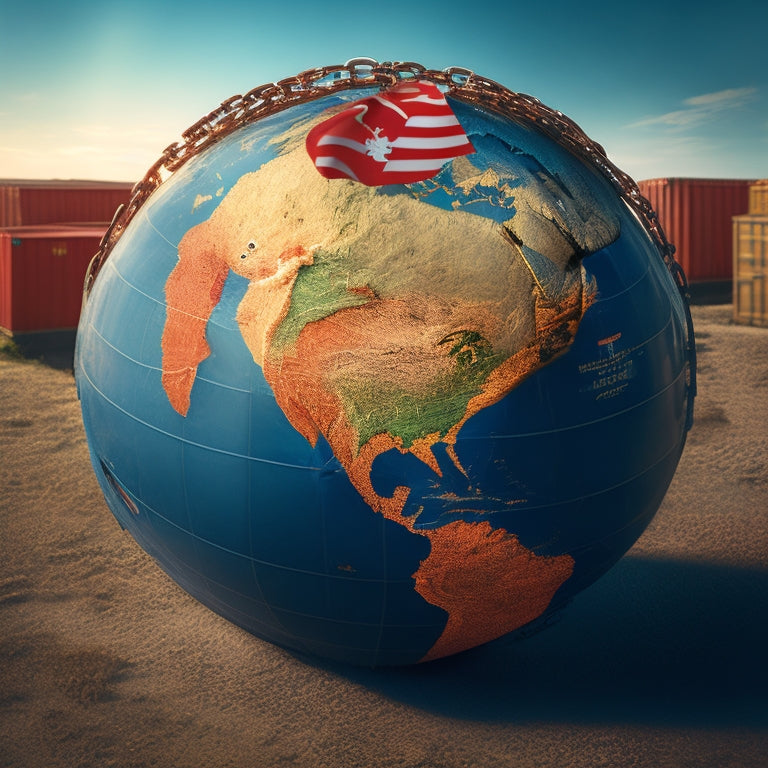
US Unleashes Broad Export Controls on Russia
Share
The US has implemented sweeping export controls on Russia and Belarus, restricting access to dual-use goods and technologies. The new regulations impose licensing requirements on a broad range of EAR99 software and commodities, severely impacting Russia's technology sector. The measures aim to limit Russia's ability to sustain its military efforts, further isolating the country from the global economy. With over 300 entities and individuals subject to blocking sanctions, the economic pinch on Russia is expected to be significant. As the complexities of these new controls unfold, the full extent of their implications will become clearer.
Key Takeaways
• The US has expanded export controls on Russia and Belarus, imposing new licensing requirements and restrictions on various software and commodities.
• The new controls aim to limit Russia's access to critical components and technologies, profoundly impacting its war economy.
• Over 300 Russia-related individuals, entities, and vessels have been sanctioned, subjecting them to blocking sanctions and limiting their access to the global financial system.
• The export of certain IT and cloud-based services to the Russian Federation has been prohibited, with detailed FAQs issued by OFAC.
• The implementation of 522 new HTS-6 code entries has significantly updated export control regulations, further restricting the transfer of software and technologies to Russia and Belarus.
Export Controls on Russia and Belarus
The Bureau of Industry and Security (BIS) has significantly expanded export controls on Russia and Belarus, introducing new licensing requirements and restrictions on a wide range of EAR99 software and commodities.
This move is expected to have significant economic implications, particularly on Russian technology. The new controls will make it challenging for Russian and Belarusian businesses to operate, as they will need to navigate complex licensing requirements. Exclusions are provided for software destined to certain industries and civil end users, but the restrictions will still limit technology transfers to Russia and Belarus.
The consolidation of export controls into Section 746.8 aims to simplify the process, but users will still need to refer to multiple appendices for specific items.
Impact on Russia's War Economy
In a concerted effort to cripple Russia's war economy, the US government has imposed sweeping export controls and sanctions targeting various sectors of the Russian economy.
The economic sanctions and technology restrictions aim to limit Russia's access to critical components and technologies, thereby weakening its military capabilities.
The new controls will make it challenging for Russian and Belarusian businesses to operate, as they will face significant hurdles in acquiring essential goods and services.
The US government's actions will likely have a profound impact on Russia's war economy, making it difficult for the country to sustain its military efforts.
As the restrictions take hold, Russia's economy is expected to feel the pinch, further isolating the country from the global community.
Entity List and Savings Clause
BIS has bolstered its Entity List by adding five entities and eight addresses, primarily linked to the transshipment of controlled items to Russia, in a bid to combat shell companies and high-risk diversion addresses. This move aims to prevent the circumvention of export controls, as these addresses are suspected of facilitating the unauthorized transfer of controlled goods to Russia.
The list of addresses is expected to grow and will be published, providing transparency and enabling businesses to make well-informed decisions. A savings clause allows shipments en route before June 12 to proceed under previous regulations, provided they are completed by July 12. This temporary reprieve gives companies a window to adjust to the new rules and guarantee compliance.
OFAC/State Designations and Prohibitions
Sanctions have been imposed on over 300 Russia-related individuals, entities, and vessels, subjecting them to blocking sanctions and severely limiting their access to the global financial system. As a result, these designated entities face significant hurdles in conducting international business.
The Office of Foreign Assets Control (OFAC) has also prohibited the export of certain information technology (IT) and cloud-based services to the Russian Federation, with limited exceptions. OFAC has issued detailed FAQs defining prohibited services, ensuring clarity on what is and isn't allowed.
Existing authorizations for specific transactions remain in effect, providing a glimmer of hope for some. However, the overall impact of these designations and prohibitions will no doubt be felt across the Russian economy.
Export Control Updates and Additions
Recently, the Bureau of Industry and Security (BIS) has implemented significant updates to the export control regulations, including the addition of 522 new Harmonized Tariff Schedule (HTS)-6 code entries, which encompass a wide range of products, from kitchen sinks and bathtubs to software and other technologies.
These updates will have a substantial economic impact on Russia and Belarus, as they will face new licensing requirements for a wide range of EAR99 software. Additionally, the new controls will make it challenging for Russian and Belarusian businesses to operate.
-
The new controls will restrict the export of consumer electronics and related accessories.
-
The technology restrictions will limit the transfer of certain software and technologies to Russia and Belarus.
-
The economic impact will be felt across various sectors of Russia's economy, including the war economy.
Sanctions and Tariffs on Russia/Belarus
How will the latest sanctions and tariffs imposed on Russia and Belarus by the US government impact their economies and trade relationships?
The short answer is: to a great extent.
The new sanctions and tariffs will have wide-ranging economic repercussions, making it challenging for Russian and Belarusian businesses to operate.
Technology restrictions, in particular, will limit their access to critical components and software, stifling innovation and growth.
The US government's move is a deliberate attempt to weaken Russia's war economy, and the sanctions will indeed have a tangible impact on various sectors of their economy.
As the restrictions take hold, Russia and Belarus will need to adapt quickly to survive, or risk being left behind in the global economy.
US Enhances Export Control Measures
The US government's latest move to bolster export control measures has greatly tightened the regulatory screws on Russia and Belarus, casting a wide net of restrictions that will have far-reaching implications for businesses operating in these countries. This enhanced regulatory framework is designed to limit the flow of sensitive technologies and goods to these nations, thereby mitigating the economic impact of their actions.
Here are three key aspects of the enhanced export control measures:
-
Stricter licensing requirements: The new rules impose stricter licensing requirements for a wide range of dual-use goods and technologies, making it more difficult for Russian and Belarusian businesses to access these items.
-
Broadened scope of restrictions: The enhanced restrictions now apply to a broader range of products, including consumer goods like kitchen sinks and bathtubs, as well as software and other intangible items.
-
Streamlined regulations: Despite the increased restrictions, the new regulations aim to simplify the export control process by consolidating rules into a single section, making it easier for businesses to navigate the complex regulatory landscape.
Frequently Asked Questions
How Do These New Export Controls Affect US Businesses Operating in Russia?
US businesses operating in Russia face compliance challenges and logistical nightmares as new export controls restrict software and commodity exports, necessitating careful navigation of updated regulations to avoid penalties and reputational damage.
Can Russian Companies Still Import Non-Controlled Items From the Us?
Russian companies can still import non-controlled items from the US, but may need to explore import alternatives, as the new export controls and sanctions restrict certain goods, impacting Russian trade and commerce operations.
Will These Sanctions Apply to Russian Oligarchs' Personal Assets Abroad?
Russian oligarchs' personal assets abroad, including frozen assets and secret wealth hidden in offshore accounts, may be targeted by these sanctions, but the effectiveness of asset tracing and enforcement remains a significant challenge.
Are There Any Exceptions for Humanitarian Aid or Non-Profit Organizations?
As a lifeline in turbulent waters, aid exemptions and humanitarian carveouts provide a narrow passage for non-profit organizations to navigate the complex export control landscape, ensuring crucial assistance reaches those in need.
How Will the US Enforce These Export Controls and Sanctions on Russia?
To guarantee effective enforcement, the US will rely on robust Customs Compliance measures, leveraging International Cooperation with partner countries to monitor and intercept illegal exports, and utilizing advanced tracking technologies to detect violations.
Related Posts
-

Boost Productivity With Free Google Sheets Templates
You can enhance your productivity exponentially by utilizing free Google Sheets templates, which offer a proven way t...
-

Streamlined Kitchen Sink Organization Solution
A streamlined kitchen sink organization solution must balance functionality with aesthetics. A well-designed system s...
-

Transformative Techniques and Innovations in Mud Building
You're about to discover the cutting-edge of mud building, where ancient techniques meet modern innovations. Revoluti...


